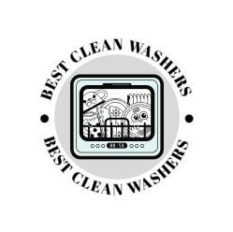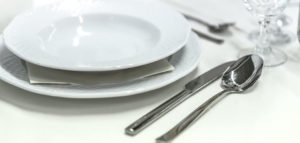If you are new to using a dishwasher to wash your dishes you may be wondering if the dishwasher cleaner and rinse aid are the same thing.
While both products are cleaning agents used in the dishwasher, they serve different purposes.
And in this article, we shall explain in detail the main difference between the dishwasher cleaner and rinse aid.
We shall talk about how to use both cleaning products and the benefits of each of them.
Table of Contents
Dishwasher Cleaner Vs Rinse Aid:
The dishwasher cleaner is designed to clean the interior of the dishwasher itself, while the rinse aid is used to improve the cleaning and drying performance of the dishwasher.
In simple terms what this mean is that a dishwasher cleaner is used to remove buildup and residue like grease, food particles, and grime.
All this buildup if not removed will affect the cleaning performance of the dishwasher and that’s where the dishwasher cleaner comes in.
Dishwasher cleaner is a product that is used to remove buildup and residue from the interior of the dishwasher.
Now the dishwasher cleaner is typically used once a month to keep the dishwasher running smoothly.
The rinse aid, on the other hand, is a product that is added automatically to the dishwasher during the rinse cycle.
It is designed to help water sheet off dishes and glasses, by reducing the surface tension of the water which can improve drying performance and prevent spots and streaks on dishes leaving your dishes clean and dry.
What is the benefits of using dishwasher cleaner?
Using the dishwasher cleaner on a regular basis can help to keep your dishwasher running effectively and it also prevents bad smells from coming out from the dishwasher.
Regular cleaning and usage of the dishwasher cleaner can also help to extend the lifespan of your dishwasher by preventing damage that could have been caused by buildup and residue.
Additionally, if your dishwasher is free from grease buildup and residue your dishes will come out sparkling clean all the time and free of odors.
What it the benefits of using rinse aid?
The main advantage of using a rinse aid in a dishwasher is that it helps the dishwasher dry dishes more effectively and without any water spots.
It can also help to prevent the buildup of mineral deposits in the dishwasher, which can affect its performance over time.
Additionally, using a rinse aid can help to reduce the amount of time needed to dry dishes, which can be especially helpful for busy households.
How to Use Dishwasher Cleaner:
Cleaning the inside of your dishwasher with a dishwasher cleaner is a simple and easy process that can be accomplished in a few steps.
To begin, make sure that your dishwasher is empty before starting the cleaning process.
While some dishwasher cleaners can be used even when dishes are inside the dishwasher, it is better to be safe and have the dishwasher empty before proceeding.
Next, select a dishwasher cleaner that is compatible with your dishwasher and read the instructions on the package.
Following the instructions is important to ensure that you are using the cleaner correctly and effectively.
Now you should place the dishwasher cleaner in the appropriate compartment, usually, it can be tossed right into the dishwasher mostly at the bottom of the dishwasher.
Run your dishwasher on the hottest cycle available so as to ensure the cleaner is activated and it effectively cleans all the inside of your dishwasher.
And once the cycle is complete, wipe down the interior of your dishwasher with a clean, damp cloth to remove any remaining residue.
How to Use Rinse Aid:
Rinse aid is a useful cleaning agent that helps to prevent water spots on your glassware and dishes as it also makes the drying process easy and faster.
Now here’s how to use the rinse aid in your dishwasher:
You should locate the rinse aid dispenser in your dishwasher, it is usually located near the detergent dispenser.
Fill the dispenser with rinse aid according to the manufacturer’s instructions.
You then adjust the dispenser setting to the appropriate level, usually between 1 and 6, depending on the hardness the water in your home and the amount of rinse aid needed.
Now you can run your dishwasher as usual, and the rinse aid will be dispensed automatically during the final wash or rinse cycle.
Using rinse aid can help keep your dishwasher running smoothly and effectively, and can improve the cleanliness of your dishes.
You should follow the instructions carefully and choose products that are compatible with your dishwasher to ensure the best results.
What are the main ingredients in a dishwasher cleaner?
A dishwasher cleaner is a specialized cleaning product that is formulated to remove mineral buildup, grease, and food debris from your dishwasher.
The main ingredients in a dishwasher cleaner can vary depending on the brand and formulation, but some common ingredients include:
Citric acid
Sodium carbonate
Sodium bicarbonate
Sodium citrate
Enzymes
Citric acid is a natural acid that is effective at breaking down mineral buildup and removing stains.
Sodium carbonate and sodium bicarbonate are alkaline substances that help to neutralize acids and dissolve grease and food debris.
Sodium citrate is a chelating agent that helps to bind to minerals and remove them from the dishwasher.
Enzymes are biological molecules that can break down complex molecules, such as proteins and starches, into smaller, more manageable components.
What are the common ingredients in rinse aid?
The main ingredients in rinse aid can also vary depending on the brand and formulation, but some common ingredients include:
Surfactants
Acidic compounds
Chelating agents
Polymers
Surfactants are compounds that reduce the surface tension of water, allowing it to spread evenly over surfaces and preventing water droplets from forming.
Acidic compounds, such as citric acid or phosphoric acid, can help to neutralize alkaline residues and prevent mineral buildup.
Chelating agents, such as EDTA or NTA, can help to bind to minerals and prevent them from depositing on surfaces.
Polymers are substances that can form a thin, protective film over surfaces, helping to prevent water from sticking and promoting faster drying.
Safety Precautions
How safe is a dishwasher cleaner?
Dishwasher cleaners are generally safe to use as long as you follow the manufacturer’s instructions.
However, it is important to keep in mind that dishwasher cleaners contain chemicals that can be harmful if ingested or come into contact with skin or eyes.
Therefore, it is important to take the following safety precautions:
Do not ingest dishwasher cleaner
Keep dishwasher cleaner out of reach of children and pets
Store dishwasher cleaner in a cool, dry place away from moisture and direct sunlight
Do not mix dishwasher cleaner with other cleaning products
How safe is rinse aid?
It is also generally safe to use a rinse aid when washing your dishes as long as you follow the manufacturers instructions.
Nonetheless it is important to take note of safety precautions when using the rinse aid especially if you have children around you in the house.
Here are some safety tips you need to be aware of when using rinse aid:
Keep rinse aid out of reach of children and pets
Do not ingest rinse aid
Store rinse aid in a cool, dry place away from heat and direct sunlight
Do not mix rinse aid with other cleaning products
Final Thoughts:
There is no doubt that dishwasher cleaner and rinse aid are not the same products. While both are used in dishwashers, they serve different purposes and are formulated differently.
While some dishwasher cleaners may contain ingredients that can help with rinsing and drying, they are not a substitute for rinse aid.
Similarly, using rinse aid alone will not clean the dishwasher’s interior or remove stubborn stains and debris.
It is important to use both products as directed by the manufacturer for optimal performance and results.
Be sure to read the labels carefully and follow the instructions for use and dosage.





